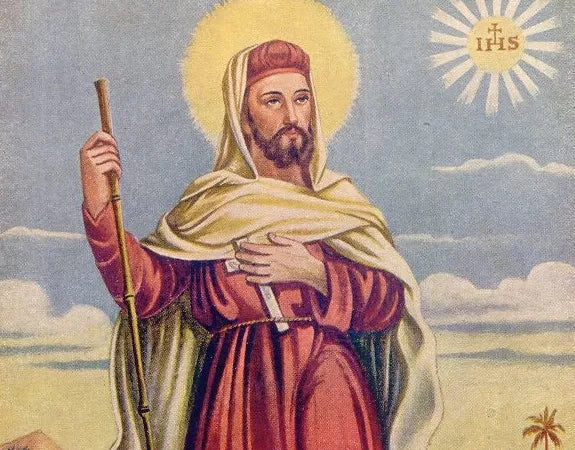
The Enduring Legacy of Saint John de Britto: The "Portuguese St. Francis Xavier"
|
|
Time to read 4 min
|
|
Time to read 4 min
Saint John de Britto, often revered as the "Portuguese St. Francis Xavier," is a towering figure in the history of Christianity in India. Born into Portuguese aristocracy in 1647, his life took an unexpected turn, leading him from a life of privilege to a martyr's death in the service of his faith. His story, one of cultural adaptation, unwavering devotion, and ultimate sacrifice, continues to inspire generations of believers and historians alike.
From Courtly Life to a Calling:
John de Britto's early life unfolded amidst the luxuries of the Portuguese court in Lisbon. He was the son of a Viceroy and enjoyed the company of royalty, including a close friendship with the young prince who would become King Peter II. However, a near-death experience in his youth instilled a deep sense of piety within him. He vowed to dedicate his life to God, a decision that surprised his family and set him on a different course.
Joining the Jesuits:
At the young age of 16, John de Britto joined the Society of Jesus, the Jesuits. This religious order, known for its educational and missionary work, provided him with the perfect platform for his newfound devotion. He excelled in his studies and displayed a keen understanding of languages and cultures.
A Call to India:
India, a land of rich cultural heritage and diverse religious traditions, beckoned the young Jesuit. In 1673, John de Britto embarked on a journey that would define his life. He arrived in Madurai, a bustling city in southern India, then a part of the Portuguese colonial empire.
Embracing Local Culture:
Unlike many missionaries who sought to impose Western customs alongside Christianity, John de Britto adopted a unique approach. He recognized the importance of cultural sensitivity in spreading his faith. He learned Tamil, the dominant language of the region, and even adopted elements of Indian attire. This cultural immersion allowed him to connect with the local population on a deeper level.
A Life of Service and Preaching:
John de Britto dedicated himself to serving the local communities. He established schools, provided healthcare, and preached the message of Christianity with passion and compassion. His efforts resonated with many, leading to a significant number of conversions.
Facing Persecution:
However, his success also attracted opposition. Hindu and Muslim religious leaders felt threatened by his influence. Furthermore, his association with the Portuguese colonial power alienated some sections of the population. John de Britto found himself caught in the middle, facing persecution from all sides.
A Martyr's Death:
In 1684, John de Britto was captured by the king of Ramnad, a local ruler wary of Portuguese influence. Despite being offered safe passage if he renounced his faith, John de Britto refused. He remained steadfast in his beliefs, and after a brutal torture session, was executed in 1693.
Lessons for Our Times:
Saint John de Britto's story offers valuable lessons for our times:
Beyond the "Portuguese St. Francis Xavier":
Saint John de Britto's story is more than just a comparison to another famous missionary. He was a man of his time, grappling with the complexities of colonialism, religious conversion, and cultural exchange. His life and legacy continue to inspire and challenge us to approach faith, dialogue, and cultural understanding with sensitivity and respect.
Saint John de Britto's story is undeniably inspiring. However, a deeper look reveals a multifaceted figure operating within a dynamic historical context.
Beyond the Saintly Narrative:
Focusing solely on John de Britto's martyrdom can overshadow the complexities of his missionary work. While he is revered for his cultural adaptation, questions remain regarding the effectiveness and limitations of his approach.
Did Accommodation Go Too Far?
John de Britto's adoption of local customs and dress, while promoting cultural understanding, may have blurred the lines between Christianity and existing religious practices. This "inculturation" strategy may have been misconstrued by some, creating confusion about core Christian beliefs.
The Role of Colonialism:
Saint John de Britto's association with the Portuguese colonial power presents another layer of complexity. His missionary work coincided with Portuguese colonial expansion in India. This raises the question of whether conversions were driven by genuine faith or influenced by colonial power dynamics.
A Legacy Open to Discussion:
By acknowledging these complexities, we can engage with Saint John de Britto's legacy in a more critical and insightful way. His story opens a dialogue on:
Learning from the Past, Shaping the Future:
Engaging with the complexities of Saint John de Britto's life offers valuable lessons for our times:
Beyond the Martyr's Halo:
Saint John de Britto's legacy deserves recognition beyond the halo of martyrdom. He was a complex figure who navigated the intersections of faith, culture, and colonialism. His story serves as a springboard for critical reflection, reminding us of the importance of cultural sensitivity, ethical missionary practices, and respectful dialogue in a world of diverse faiths.